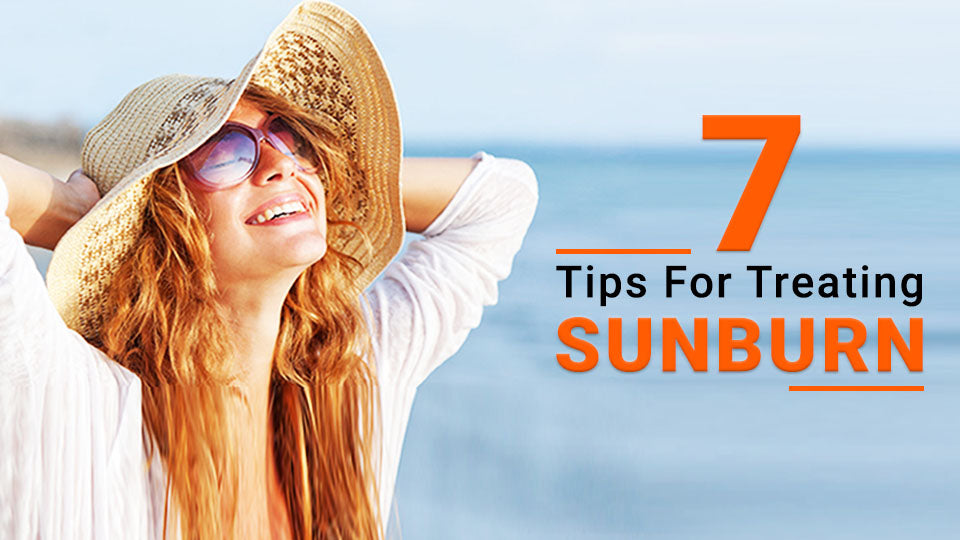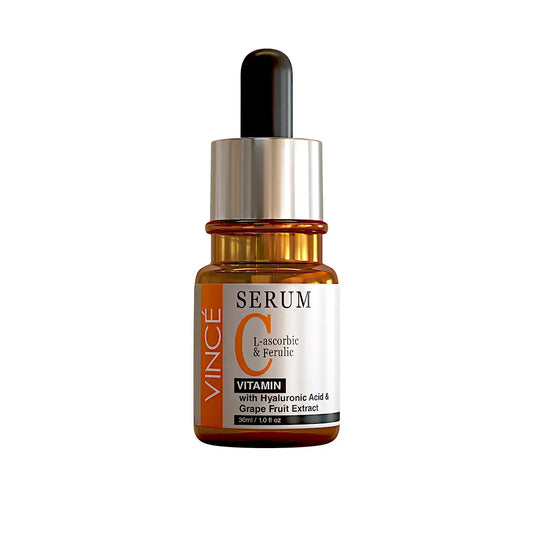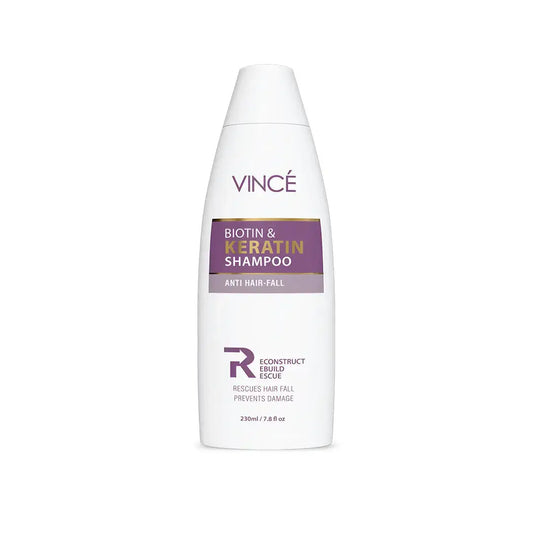7 Amazing Tips for Treating Sunburn

If you have pale skin or spend a lot of time in the sun, you are at increased risk of sunburn. In general, more severe sunburns take longer to heal than milder cases.
Other factors determine how quickly you heal, how well you manage your sunburn, and whether you have a condition that slows the healing process, such as diabetes or artery disease.
There is no magic cure for sunburn, but there are many ways you can support your body's natural healing process.Let's look at the most effective ways to heal sunburn fast.
7 Amazing Tips for Treating Sunburn
Here are some ways to get sunburn relief.
- Cool Down
- Get Moisturized
- Use Aloe Vera
- Wear Loose Clothing
- Don't Pop the Blisters
- Treat the Itching
- Prevent the Damage
1. Cool Down
As soon as you realize you have sunburn, get out of the sun and start cooling your skin. If you are near a body of water, dive quickly.
Then, as you continue to suffer sunburn, take cool baths and showers.
Adding baking soda or oatmeal to a cold bath can provide extra relief. You can also apply a cold compress to your skin.
Soaking washcloths in cool water and then applying them to your irritated skin can help relieve some discomfort. Do not apply ice to your burn, as extreme cold can damage your extra-sensitive skin.
2. Get Moisturized
Lotions and gels soothe and protect the skin as it heals. Apply moisturizer to your skin immediately after bathing and getting out of the shower while your skin is still damp. Make sure to continue moisturizing your skin if it starts to break out.

The lotion will help prevent further peeling and soothe your rough skin. Use lotions labeled "for sensitive skin" that are fragrance- and dye-free. Your skin doesn't need any extra irritation.
3. Use Aloe Vera
Use aloe vera toner squeezed directly from a plant can relieve your itchy skin. Don't go for lotions that contain aloe vera. Usually, more than the amount of aloe in a toner or cream is needed to be beneficial.

Not only does aloe vera help with sunburns, but it also helps to moisturize the skin and reduce breakouts.
Refrigerating your aloe vera gel while you apply the chilled gel is a great way to pack a double punch for sunburn relief.
4. Wear Loose Clothing
You want to minimize the amount of potential irritation on your sensitive skin. Wearing loose clothing will help your skin feel better and heal faster.
Dark or bright-colored clothing does better to keep the rays off your skin than white or light-colored clothing. Wear a fabric with a tight-knit, and remember that wet clothes are more likely to let in the sun's rays.
5. Don't Pop the Blisters
If your skin blisters, a second-degree burn has damaged your skin. The blisters are there to help protect the skin of the wound -- don't pop them. Let the blisters take their natural course.
If the blister breaks before the underlying skin healing, gently wash the area with mild soap, apply antibiotic cream, and cover it with a nonstick bandage until the skin is less raw.
6. Treat the Itching
You may experience itching from sunburn, especially if your skin starts to peel. You can apply a corticosteroid cream to relieve sunburn.
Like aloe vera gel, refrigerate the ointment, so it feels even better when you rub it on. You should also take an oral antihistamine such as diphenhydramine to calm your itchy skin.
7. Prevent the Damage
Sunburn is more than temporary discomfort. Sunburned skin increases the risk of skin cancer. The risk of sunburn is hard to remember because the actual effects of the damage come years after the sunburn.
But the statistics are disturbing. One sunburn in childhood doubles the risk of melanoma later in life.

Five or more sunburns in your life more than double your chance of developing melanoma, the deadliest of skin cancers. Although it's painful to take steps to prevent sun damage, it's worth the time and energy to protect your skin and your life.
Sometimes, uneven skin tone resolves itself quite quickly. But usually, evenings take a little elbow grease in the form of skin care treatments and brightening ingredients. Since uneven skin is a common concern, we're compiling our best tips for even skin tone.
Other effective tips to support the healing process and relieve symptoms:
1. Take a nonsteroidal anti-inflammatory drug (NSAID):
Taking an NSAID like ibuprofen right after you feel sunburn can help reduce inflammation and pain.
2. Get lots of sleep:
Sleep deprivation disrupts your body's production of specific cytokines that help your body regulate inflammation. This blockage can negatively affect your body's ability to heal itself.
3. Avoid Using Tobacco:
Smoking or using other forms of tobacco can harm your body's natural healing process by promoting inflammation. Quitting can be difficult, but a healthcare professional can help create a cessation plan that works for you.
4. Avoid excess sun exposure:
Exposing sunburn to more ultraviolet (UV) rays can further damage your skin. If you must go outside, try to cover your sunburn with clothing and wear sunscreen.
5. Apply Aloe Vera:
Aloe vera contains a substance that reduces inflammation. Aloe vera moisturizes your skin and can prevent peeling.
6. Cold Bath:
The American Academy of Dermatology recommends a cool bath or shower to soothe your skin. Then, when you're dry, leave some moisture on your skin and apply a moisturizer to lock in the water.
7. Apply hydrocortisone cream:
Hydrocortisone creams treat swelling, irritation, and itching. Apply hydrocortisone cream to control swelling and pain.
8. Stay Hydrated:
Sunburn strips moisture from your skin. Drinking plenty of liquids like fresh juices and electrolytes can help rehydrate skin.
9. Try a Cold Compress:
Applying a cold compress to your skin but not directly to the sunburn for short periods shortly after the burn can help remove excess heat from your skin and reduce inflammation.
10. Try an oatmeal bath:
An oatmeal bath can help soothe your skin and reduce irritation. You can make an oatmeal bath for a cool bath by mixing a few tablespoons of baking soda and about a cup of oatmeal.
Applying essential oils such as chamomile, sandalwood, peppermint, lavender, and diluted apple cider vinegar can help heal sunburns.
However, these methods have yet to be scientifically proven. Following the recommendations for safe skin use is essential if you choose to use these methods.
Most instances of first-degree sunburn should take at least a week to heal; even when treated appropriately, more severe sunburns can take weeks or even months.
Spending time outdoors is a great way to stay physically active, reduce stress, and get vitamin D. However, without proper protection, as little as 15 minutes in the sun can cause sunburn.
These are the 7 best remedies for sunburn skin. If you got sunburn skin, then you need to read this blog and make your skin healthy and beautiful.
Seeking Medical Help
It will likely heal on its own if your sunburn is mild. No medical treatment is required. However, if your burn is second-degree or more severe, you may need to see a doctor.
If any of the following are true, it's a good idea to talk to a doctor:
- Your sunburn blisters or swells.
- You feel feverish, chilly, or overheated.
- You have nausea or vomiting.
- You are dehydrated.
- You feel dizzy, sick, or tired.
- You have a headache
- You develop muscle pain.
Sunburn on a baby, toddler, or child should take even more seriously because children with these burns are at higher risk for skin cancer later in life.
If your child has sunburn, especially severe symptoms, it is essential to seek medical treatment.
Conclusion
You've been out in the sun a little longer than you intended, and now you're wincing every time your clothes move against your tanned skin.
While you can't make the burn go away, you can take some simple steps to soothe your skin and be more comfortable as your skin heals.
Stay hydrated and calm, and take ibuprofen if the sunburn is too painful. It would help if you also covered up the next time you go out, so you don't get too sunburned. Call a doctor if you develop a fever from the sun or show dehydration signs.





